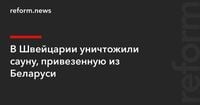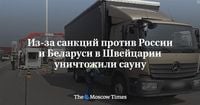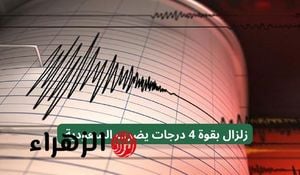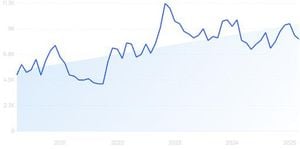In recent investigations into the enforcement of sanctions against Russia and Belarus, Swiss authorities have revealed notable violations involving the export of luxury goods and items potentially intended for military use. The Swiss radio and television broadcaster RTS uncovered 54 cases reviewed by the State Secretariat for Economic Affairs (SECO) from November 2022 to September 2024, with 21 cases resulting in penalties.
According to RTS, the total fines levied by SECO reached approximately 50,000 Swiss francs, while the value of the seized goods amounted to around half a million francs. These sanctions have been described as relatively lenient, with many violations attributed to negligence rather than intentional attempts to bypass the embargo.
Among the more peculiar cases included a sauna imported in disassembled form from Belarus, which was intercepted by customs in Geneva. The importer was fined 1,000 francs, and the sauna was subsequently destroyed. This incident highlights the ongoing challenges faced by customs officials in enforcing sanctions effectively.
Additionally, a significant case involved luxury watches valued at 276,000 Swiss francs, purchased by a Russian resident and intercepted at Geneva Airport. The jewelry store that sold the watches received an official warning from SECO and was fined the maximum amount of 5,000 francs. Other intercepted items included leather bags, jewelry, paintings, and various industrial components such as electrical resistors, pressure converters, valves, and engraving rollers, all of which could potentially be utilized for military purposes or bolster the Russian economy.
Switzerland joined the European Union's sanctions regime in March 2022, which aimed to restrict the flow of luxury goods and other products that could support military activities. The sanctions list includes high-end items such as watches, jewelry, designer accessories, and industrial equipment that could serve dual purposes.
In a broader context, the enforcement of these sanctions is not limited to Switzerland. Other European nations have also taken stringent measures against violations. For instance, in March 2025, Lithuanian authorities decided to auction off 17 milk trucks and 17 fire engines, produced in Belarus, which had been detained at the Klaipeda port since 2023. The Lithuanian General Prosecutor, Nida Grunskiene, expressed hope that the equipment would be purchased for use in Ukraine, where it is critically needed.
These trucks were reportedly intended for third countries—milk trucks were bound for Cuba, while fire engines were destined for Zimbabwe. However, Lithuanian authorities suspected that the transportation violated EU sanctions against Belarus. In response, the Zimbabwean government officially protested, emphasizing the necessity of the equipment for firefighting and protecting UNESCO sites.
Despite the visit of the Zimbabwean Attorney General to Lithuania in early 2024, efforts to return the equipment were unsuccessful. The entire shipment was confiscated, and the customs department moved forward with the auction process.
As the situation evolves, the enforcement of sanctions against Russia and Belarus continues to be a focal point for Swiss and European authorities. The SECO's actions reflect a commitment to uphold international agreements while navigating the complexities of global trade.
In summary, the recent investigations into sanctions violations in Switzerland reveal a mix of negligence and the ongoing challenge of enforcing restrictions on goods that could bolster the Russian regime. The enforcement of these sanctions is crucial not only for maintaining international norms but also for supporting efforts to address the ongoing conflict in Ukraine.






